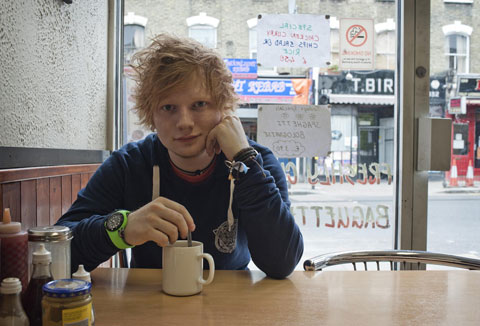
MIND OVER MATTER "I try to make good music without thinking too much about what genre it fits into," says songwriter Ed Sheeran. |
Judging by outward appearances, Ed Sheeran is not your typical pop sensation. With his shock of tousled red hair and taste for casual apparel such as T-shirts and sneakers, the British singer-songwriter looks more like your average sleepy college student. And his childhood was average, too. Growing up in Suffolk, England, the now-21-year-old Sheeran absorbed the music of his parents — mainly, classic-rock staples such as Bob Dylan, the Beatles, and Fleetwood Mac. But his career aspirations crystallized at age 12, after he saw Irish singer-songwriter Damien Rice and decided that music was his calling.
Sheeran is a megastar in the UK, Australia, and New Zealand, thanks to his 2011 debut full-length, + (which is being released in June in the US via Elektra), and the hushed acoustic single from that album, "A Team." At the core, he's a folksy troubadour — although he isn't your usual vanilla, sensitive guy-with-a-guitar. As a teenager, Sheeran honed his performance skills by playing hip-hop nights as well as acoustic gigs. In fact, the former genre is his biggest lyrical muse. "The flow of the raps really inspires my lyrics, even on songs with no obvious hip-hop influence," he says by phone after a hectic slate of SXSW shows.
Sheeran's back catalog reinforces this claim. Last year's No. 5 Collaborations Project EP found him working with UK grime artists/emcees such as Wiley, Devlin, and JME; and + features contributions from producer No I.D., who's worked with Common, Kanye West, and Jay-Z. More recently, Sheeran released Slumdon Bridge, a mixtape with rap phenom Yelawolf.
These genre splices are no gimmick. On Slumdon Bridge's leadoff track, "London Bridge," Sheeran's troubled tremble and rattled acoustic strumming serve as a pained counterpoint to the song's ominous heartbeat and Yelawolf's somber delivery. On +, Sheeran twists his soulful croon with Timberlake-like beat-boxing and speedy raps ("You Need Me, I Don't Need You") and hip-hop-influenced cadences (the piano-boosted ballad "Lego House," the R. Kelly-like "U.N.I.").
"I'm just really lucky that I got accepted into that urban grime scene in London when I first moved there, so that has been a big influence on me," Sheeran says. "I try to make good music without thinking too much about what genre it fits into, which is probably why it comes across quite seamless." As to why hip-hop artists and producers have been drawn to his voice and music, Sheeran says, "The bravery of what I was doing with those shows impressed them, I think — a white, ginger kid from Suffolk going to these nights and having the balls to get up and play."
Perhaps the most outlandish (but true) example of Sheeran's brave perseverance occurred in 2010, when his ambition helped him cross paths with actor/musician Jamie Foxx. "I felt myself in a rut playing the same acoustic nights over and over, so I packed my bags — with only one contact — and went to LA for a month. The producer of Jamie's radio show was at one of the gigs and invited me onto the program, where I met Jamie and he invited me to stay at his place for a few nights and use his studio."